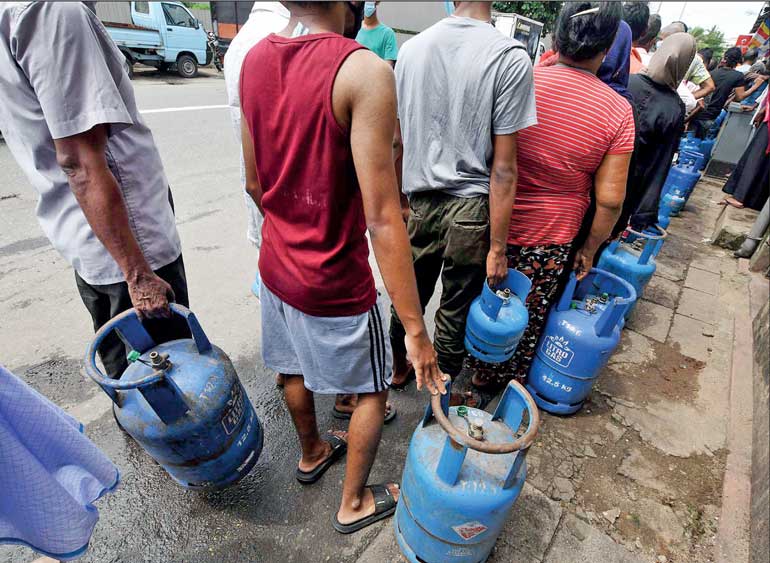Tuesday Feb 17, 2026
Tuesday Feb 17, 2026
Saturday, 13 November 2021 00:00 - - {{hitsCtrl.values.hits}}

Shortages in essential household items such as rice, milk powder, sugar, condiments, gas fuel, and so on are affecting practically every consumer – Pic by Shehan Gunasekara
|
 The economy has failed and failed miserably. No amount of camouflaging with massaged statistics and confidence boosting oratory can hide the extent of economic calamity facing the nation and its millions of ordinary citizens. Even the credit over success in controlling the COVID pales into insignificance in the face of worsening economic crisis.
The economy has failed and failed miserably. No amount of camouflaging with massaged statistics and confidence boosting oratory can hide the extent of economic calamity facing the nation and its millions of ordinary citizens. Even the credit over success in controlling the COVID pales into insignificance in the face of worsening economic crisis.
Shortages in essential household items such as rice, milk powder, sugar, condiments, gas fuel, and so on are affecting practically every consumer. Enough had been said already by economists, administrators and journalists about the underlying causes of this economic mess.
But there is no doubt that when future economic historians begin to analyse the reasons for the current crisis, they would find its true origins go back to the civil war and its unaffordable cost. It was the sheer magnitude of the financial burden carried from that war combined with endemic corruption and waste at official levels that snowballed over the years and now punishing the economy with vengeance. Let history have the final say on this issue.
For the time being, the immediate causes for the disaster are clear. Depleting foreign reserves, depreciating currency, rising inflation, unpredictable increase in prices of consumer goods, falling Government revenue and widening trade deficit are here to stay. Borrowing from friendly countries and currency swaps are band aid solutions to a malignant cancer that needs surgery.
Poverty and misery
Incidents of poverty and misery not to mention suicides are on the rise. Farmers, teachers, trade unionists, university academics, salaried officials and self-employed are all coming out to the street to protest and demand deliverance from crushing economic pressures.
All that the Government could offer is for the Minister of Finance to advise people to eat manioc if rice is not available and learn to live with escalating prices. How much of belt tightening does this Minister expect from an already undernourished people? His Budget is undoubtedly going to be disappointing to ordinary consumers, because the Treasury is virtually bankrupt to offer any handouts or concessions. However, there will be enough in it for the Minister and his ilk to earn from kickbacks and cuts when infrastructure projects are allocated in the name of economic development.
Short-sightedness
True, the pandemic caused worldwide disruption to economic growth and living conditions, but what made it worse in Sri Lanka was uncoordinated and unplanned economic policies emanating from thought bubbles of a daydreamer President schooled in militarism and thinks that his orders are enough to produce results.
How else could one explain the overnight ban on imports of turmeric, palm oil and chemical fertiliser and leave their immediate users high and dry without any alternative? Because of this short-sightedness, households, bakeries, confectioners and farmers were caught totally unprepared and are still seething with anger.
The problem with the President is that he does not understand that an economy is like a human body where a wound on one part spreads pain to the entire. Linkage effects of economic decisions should be thought out first before introducing any reform or change. The sum total of all these impulsive decisions is public anger and frustration over the regime.
Protests are increasing and Government’s popularity is crumbling. The thousands who are queuing in front of foreign embassies seeking visas to migrate tell the sorry tale of this country. If we cannot export goods let us export people, seems to be the policy of this regime. Shamelessly, the Foreign Minister welcomes that migration.
Confrontation looming
There is no hiding the fact that an open confrontation with the regime is looming. But whether it would be bloody depends on the shape and size of the confrontationists.
Attempts are being made by backers of the regime to deflect people’s anger and drive it along a different direction. The latest gimmick by GR to appoint his eleventh task force to prepare a plan of action to translate the ‘One Country, One Law’ slogan into practical reality is an act of deflection. What was mischievous in that appointment was:
(a)The choice of an ex-prisoner and street fighter who happens to be a Buddhist monk to chair the TP. It is obvious that the monk’s immediate attention would be to do away with the controversial Muslim Marriage and Divorce Act, which in any case under review by the Minister of Justice. The President is well aware of this monk’s anti-Muslim credentials.
(b)The inclusion of four Muslims into that group, who belong not to the majority orthodox Suni stream of Islam, but to a couple of obscure Sufi sects. Monk Gnanasara on few occasions had expressed his support to Sufism, but how much knowledge he espossess on this subject is another story.
Anyhow, this TF and its membership are a clear act of provocation. Above all, it is the timing of this appointment that makes GR’s real intention clear.
He and his regime came to power on the back of 2019 Easter massacre. True, it was committed by a lunatic fringe from the Muslim community. However, there is great suspicion especially within the Catholic community that one or two from the regime itself might have masterminded that horror. The fact that President GR is not making the report of his own Commission’s Investigation available to the public adds credence to that suspicion.
Be that as it may, having come to power by exploiting one security issue, it is possible that the President may be looking for a second one to keep the regime in power. His Lieutenant monk Gnanasara’s BBS is quite capable of manufacturing another security issue by creating splits within the Muslim community. Otherwise, why bring in a controversial minority sect to decide on a matter that affects an entire community?
If any internal fissure within the community ends in open violence, that would be enough for GR to make it a security threat and capitalise on it. One would hope that Muslims understand this ploy and take extra guard to prevent such eventuality.
Economic battle
In all probability however, the looming confrontation would not be religious or ethnic this time but economic in orientation. Also, it cannot be put down this time by hallucinating the Sinhala community with doses of communal narcotic. One cannot fool all the people all the time. Whether the final confrontation would be bloody or not depends on the size and organisational strength of the confrontationists.
President GR with some foresight has fed and pampered his military to come to his aid when needed. To him the hour of need is fast approaching. However, history shows that in front of an ocean of unarmed people military weapons automatically lose firepower. The mighty armies of the Sha of Iran and President Marcos are two instances in our lifetime where tanks and guns were of no use in front of hundreds of thousands of unarmed civilians. After all, those who drive those tanks and carry those weapons are also humans and not robots.
However, the challenge is to bring those millions under an organisational umbrella. Can the country’s Opposition and trade unions duplicate what an Ayatollah and a Cardinal did?
|
(The writer is attached to the School of Business & Governance, Murdoch University, Western Australia.)